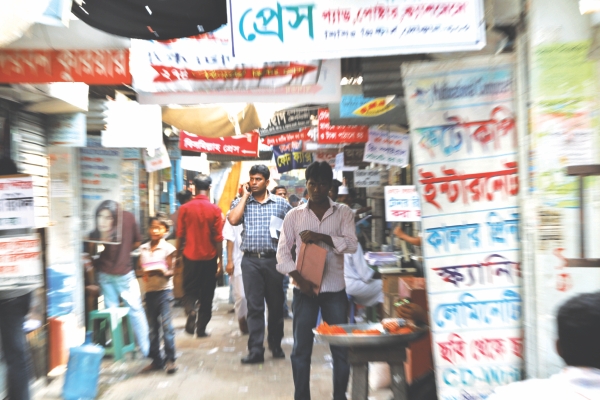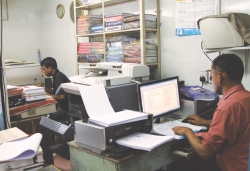| Home - Back Issues - The Team - Contact Us |
 |
| Volume 11 |Issue 16 | April 20, 2012 | |
|
|
Trends
Enterprising Nilkhet The Islamia Book Market at Nilkhet is not only a haven for bookworms, it is also a thriving cluster of small businesses. Sharmin Ahmed Mohammed Muaz Jalil, an avid book reader, makes a trip to Nilkhet twice a month and has been doing so for the last 10 years. Says Muaz enthusiastically: “I once got the whole collection of Charles Dickens' works in hardcover, on more than one occasion, dug out antique books which were over 100 years old, found Keynes' seminal work on General Employment for less than Tk 200 and countless other such rare publications. It is without a doubt our own 'Diagon Alley' and just as magical.” This is what Nilkhet is to most people who go to buy books there –a place to get a good collections at bargain prices. At the same time, it is just as rewarding for the many small enterprises in this bustling market. Mohammed Masud Rana owns two book binding shops called Amader Book Binding and Photocopy. He has been working at Nilkhet for 12 years. Masud earns about Tk 30,000 a month and distributes it among five of his partners, one of whom is a student and works part time.
The services he provides include book binding, photocopying, report and ring binding. Everyday he earns as much as Tk 800. As he squats on the floor of another shop putting glue on the cover of a book, he says, "We work together as a group and help each other in the same business. Since my store is small and there isn't much space, I am working in this bigger shop that belongs to my neighbour who also does the same trade." There are many such shops that have developed around the book stalls here and they all seem to be running well. They support each other as complementary business to that of the books in Nilkhet. Nilkhet is a labyrinth of small enterprises that are efficient because of their size. It has been a major source of academic material for the city's students since the 60s. Textbooks of all levels and for all disciplines are available here. But Nilkhet is not only about the books, many shops provide auxiliary services for students, such as photocopying, word-processing and book-binding are examples of successful small enterprises that keep this book market alive. Shamsul Haque Shumon has been working for seven years at a photocopy shop Cypher "2". He makes a profit of Tk 20,000 from earnings of Tk 80,000 from his two printing shops. He works everyday from early morning till late at night, doing what might seem monotonous. But he does not complain, because the income is steady. He says, "So many students come to us to get books, handouts and notes to be photocopied, they cannot do without us!" Penguin Book House is known to be the oldest existing book store in Nilkhet, run by Mohammed Islam Uddin. He earns around Tk 30,000 to Tk 35,000 per month. In the little store of his, he claims to have around 7,000 books. He mainly sells books on literature, philosophy and anthropology and is quite satisfied with his little book enterprise. The Nilkhet book market, being a cluster of shops, makes it beneficial to the stores in a unique way. Often one shop owner provides another shop keeper with a book he is looking for according to the customer's demand. A lot of books especially old ones are donated by students to the shopkeepers or sold to them at very reasonable rates. Islam proudly says, “Many students, when they go abroad, often give me their books and many of these are rare books that I can sell later at a good price level." Islam, who has studied up to Higher Secondary, says "I myself love reading. I read books on colonial and postcolonial literature. A lot of learned and well known people come to buy books from my shop. The trade of knowledge is very ennobling." Given that most of the shop owners started with little or no assets, setting up bigger shops is not cost effective. Masud says, “If I rent a bigger space my maintenance cost will increase, thus I will not be able to offer photocopy per page at 70 paisa instead of Tk 3. My customers will go to other cheaper smaller shops.” These small enterprises provide a two-way benefit for both the customer and the seller. Adil Khan, who has been dealing in books for five years, owns an old cutting machine which can cut up to 10,000 pages at one go. He earns around Tk 4,000 to 5,000 a month by just binding books. For him this trade is profitable especially when producing text books. “Nilkhet is situated close to many of the universities and educational institutions. We offer both old and new books, coloured and black and white, at varying prices so affordability is hardly an issue for the customer”. However, there are cases of losses that do take place. Mohammed Wazed has been working at a print and press shop for around six months making visiting cards, and computer printouts. Recently the problem of frequent load shedding and his incapacity to find alternative electricity supply has resulted in loss. Nonetheless, he has not lost hope. “We are always in high demand here, I have made an agreement with a hawker to set up on the pavement, so that I can print books for him and we can share each other's profits. Eventually, I will overcome my loss and buy an IPS. There is always something or the other that I can start off that will not cost too much.” Most of the footpath sellers who vend books on the pavements of Nilkhet seem to earn the most profit since they do not really need much to set up their stacks of books, and they usually sell pirated books of low print quality, and are able to cater to the large number of students who usually have limited cash in their hands. There are also many shops that make fake certificates and documents according to customers' instruction. Although the entrepreneurs confirmed that such shops exist, they deny knowing their exact location. "If you need them you will already know where to find them," says a shop keeper who wants to remain anonymous. A trip to the snack shops and street side biriyani shops at the market is almost an unstated ritual by all those who go to Nilkhet. With big pots of mouth watering foods on display outside their shops and that too as cheap as Tk 20 per plate, they are hard to avoid. At the end of the day, these enterprises are also a seminal and profitable part of the Islamia book market, earning up to Tk 20,000 per day. Alim Miyah who runs a biriyani shop says, “After all the book hunting one just has to come to my shop.” Mohammed Muaz Jalil who is also Manager at Monitoring and Results Measurement Group at a multi-donor funded project which works toward increasing SME competitiveness, says, "It will be wrong to perceive Nilkhet as just another book retailing cluster. The presence of strong backward linkage in the form of countless printing, publishing and specialised book binding houses significantly enhances the resilience and sustainability of this SME cluster. In a sense it is a self sufficient cluster with strongly developed support functions, which if nurtured properly, can go beyond its current parameter.”
|
||||
|

